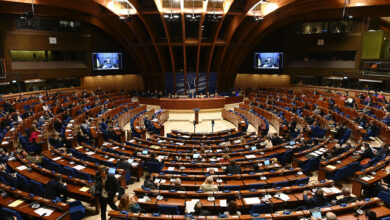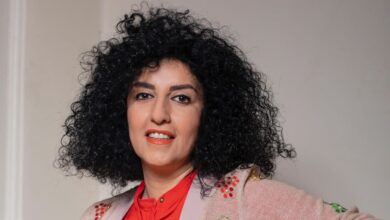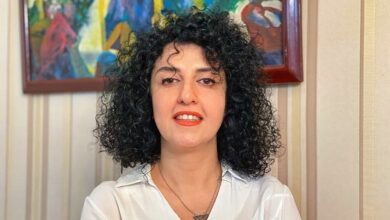
The past months in Egypt have seen fluctuating moments of protest, and despite the varying backgrounds of those who dissent, all seem to have a common enemy: the police.
“There is a case of defiance that exists,” Adel Ramadan, a researcher with the Egyptian Initiative for Personal Rights, said as he explained that “the revolution created a new air of solidarity” between different groups of people whose professional and personal interests may not at first glance seem to connect.
While there is no exact count of how many moments of anger police have triggered, “we have seen a wider streak of consecutive protests" throughout the past months.
Several instances of police brutality — including the killing of a mini-bus driver and the assault of medical staff in their hospital — has a whole cross-section of various groups of Egyptians protesting against state violence that many suggest continues to grow out of control.
Thousands of doctors across the country went on strike. Lawyers say brutality has become a part of their everyday work. The working class neighbourhood of Darb al-Ahmar surrounded police stations and chanted against police and the “dirty government.”
El Nadeem, one of the last torture monitoring organisations, are defying a closure order and say they will continue working until they are arrested. More than 400 artists and writers signed a petition expressing “anxiety” towards the state’s “oppressive practices,” and "attacks on public, personal, academic and artistic freedoms.”
Journalists protested in front of the Journalists Syndicate in solidarity with detained co-workers, nine of whom are on hunger-strike in the notorious Al-Aqrab prison. In parallel, academics have issued statements of concern over their well-being after the torture and murder of Italian PhD student and researcher Giulio Regeni.
Professionals’ solidarity against police violations
Professionals are increasingly aware of how much their interests intersect, Adel stated.
Alleged police assaults against doctors in the Cairo’s Matareya Hospital triggered mass discontent among doctors late January, when low-ranking policemen in plain clothes purportedly beat and hurled insults at doctors who refused to forge a medical statement.
Provoked by the incident, the doctors’ syndicate convened an emergency general assembly meeting that became one of the largest assemblies of protest in the past two years. Thousands of protesters chanted against police brutality and called the interior ministry “thugs.”
“The [doctors’ syndicate]’s position that day was encouraging,” said lawyer Halem Hanish.
“Police violations occur all the time,” Hanesh told Aswat Masriya, “especially with journalists and lawyers.”
“Those are the professions that expose police infringements.” Hanish explained that journalists and lawyers often work together and “are always in direct encounter with police” as lawyers provide journalists with news of detainees, extrajudicial killings, and more.
Syndicates are not always supportive, and their choice to defend members wavers, Hanish said. For example, the lawyers’ syndicate embraced angry protests following the torture and death of lawyer, KarimHamdy in the Matareya police station in February 2015. Yet Hanish maintains that syndicates often choose to “do nothing at other times,” and that action often depends on the timing of syndicate elections.
According to Mohamed Rakha, one of the members of the general assembly of the doctors’ syndicate and a long time campaigner for doctors’ rights, the Matareya assaults represented another "violation of the dignity of doctors."
After years of studying and training most Egyptian doctors “will be underpaid… and to maintain a good standard of living, they will need to overwork themselves,” Rakha said adding that “getting their dignity stepped on,” becomes the straw that breaks the camel’s back.
“This was what made the general assembly gathering and demands so attractive to doctors of all ranks,” Rakha told Aswat Masriya.
Ramadan’s analysis echoed a similar idea. One of the main reasons for discontent “especially for lawyers and doctors, is related to the idea of dignity… this is a very sensitive issue to professionals,” who according to Ramadan have had to put up with increasingly humiliating police violations.
“This condition of anger [towards police] will continue to exist,” Ramadan said adding that it will also build up every time professionals are victorious in matters related to their righter and that “anger will remain as long as the [interior ministry] keeps asserting its domination.”
Ramadan added that it is unlikely that police will change their “ill treatment of citizens.”
However, Rakha remains skeptical towards how effective such measures will be and criticised what he saw as “sedatives,” claiming that the doctors’ syndicate was still maneuvering “within the existing system.”
The syndicate will not cross “red lines” by addressing “the systematic medical negligence in prisons, or the lack of social solidarity with the cases of imprisoned doctors, or the fabricated medical certificates that are produced to cover up [the state’s] killings,” Dr. Rakha said.
Syndicates choose the battles that do not directly confront the regime, Rakha stated.
Solidarity of the ‘non-politicised’
Police brutality does not only stand in the way of people whose professions by definition often put the state under scrutiny, such as journalists, human rights lawyers, NGO workers, and social researchers. It even confronts those whose work would, at first thought, be seen as “non-politicised.”
Policemen have developed a reputation for taking products, or receiving services without payment. In other words, they “exploit” people, says Rania Mahmoud, one of the relatives of the slain mini-bus driver Mohamed Sayed, widely known as “Darbaka.”
A policeman shot Sayed in the head on February 18 after the two got into an argument over the policeman’s refusal to pay Sayed for his services. Later the interior ministry claimed that the policeman shot Sayed accidentally while attempting to control the crowd.
The ministry continues to claim that these police crimes are isolated incidents that are the faults of individual low-ranking officers rather than the entire police system.
This case, according to Ramadan, “is a little bit different."
The residents of the working-class neighbourhood of the Darb al-Ahmar displayed their own unique show of solidarity as people encircled security directorates and shouted anti-police slogans.
“It was a ghastly crime that took place in the public, in the street, in front of everyone and this provoked the people of the neighbourhood. They saw it as a violation against all of them,” Ramadan said.
This solidarity “has to do with family relations, with neighbours, with the fact that the victim was loved among the community in which he lived and this type of solidarity between residents of a specific space or neighbourhood happens a lot in Egypt.”
It is also a phenomenon that has taken place systematically before and after the revolution, Ramadan said.
“We just want justice,” Mahmoud told AswatMasriya. “We don’t want [the policeman] to get four years, or even 15 years and then get out.”
“The injustice is inside [in the police stations] and it is outside in the streets,” Mahmoud said. “The police are supposed to provide service to people not kill them.”
Mass protests that comprised the 2011 Uprising called for an end to police brutality.
“The state creates and plants the seeds of animosity and they intersect, neighbourhood after neighbourhood, profession after profession,” Ramadan said, “and in the end it is not about this neighbourhood or that profession, it is about an entire people.”




